Last of the great Mexican literary giants is mourned across the globe
Carlos Fuentes, who had just completed his latest novel, dies in Mexico City

The news flashed across Twitter before it was officially confirmed minutes later on Tuesday. Carlos Fuentes, one of Latin America's most prolific writers and a key observer of regional politics, died at Mexico City's Ángeles del Pedregal hospital of an internal hemorrhage. He was 83.
Television networks in Mexico broke their midday programming to broadcast specials about the country's most famous man of letters. Newsrooms across the world scrambled to confirm the Twitter feeds and began posting obituaries and tributes on their websites.
Mexican President Felipe Calderón issued his condolences on his own Twitter account. "I deeply lament the death of our dear and admired friend Carlos Fuentes, writer and universal Mexican. Rest in peace."
On Wednesday, people began to file past the novelist's coffin in Mexico City's Palace of Fine Arts to pay their last respects.
In 1985, Old Gringo earned him wide recognition in the United States
Author of many works, including The Death of Artemio Cruz, Change of Skin and The Crystal Frontier, Fuentes was both a catalyst and architect of what is known as "el boom" - the explosion of Latin American literature during the 1960s and 1970s. He was able to build bridges between diverse generations of Mexican writers, from the very old to the very young. "He was very kind to writers who were just starting out. They would send him their drafts and he would read them," recalled writer Jorge F. Fernández, a contributor to the publication Letras Libres.
But his larger-than-life literary career was punctuated by his brilliant and committed political commentary about the Mexican and international political scenes. Born to a Mexican diplomat father in Panama City, Fuentes spent his childhood in several Latin American nations and then traveled to Washington where he learned English at an early age.
He always felt a close connection to politics and in 1975 was appointed Mexico's ambassador to France - a post he would give up two years later to protest his government's decision to name former President Gustavo Díaz Ordaz as Mexico's ambassador to Spain when bilateral relations were reestablished following the death of General Franco. Díaz Ordaz was in office during the 1968 student massacre in Tateloco square.
In 1985, his Old Gringo - the story of Ohio-born writer Ambrose Bierce, who disappeared during the Mexican Revolution - earned him broad recognition in the United States. Four years later, it was made into a film starring Gregory Peck and Jane Fonda.
My method to stay young is to work a lot, to always have a project on the go"
Fuentes was a frequent contributor to various newspapers, including EL PAÍS, where his column appeared regularly up until his death. On Tuesday, the Mexico City daily Reforma published what is believed to be his last column - a piece about the challenges facing new French President François Hollande. He ended the column with a message to the presidential candidates in his own country: "On a Mexican note, I am concerned and I get impatient because these important issues of the day are being overlooked in the Mexican presidential debates, whose only aim is to try to point out each other's shortcomings while ignoring the agenda for the future."
During recent months, Fuentes had been very critical about the lack of political and intellectual abilities among the three top Mexican contenders, who will run on July 1. He also found fault with President Calderón's direct war with the drug cartels, which has cost some 50,000 lives since it began six years ago. Still, despite his swipes at the establishment, his death was mourned by all sectors of Mexican life. "It was an unexpected death," said writer Héctor Aguilar Camín. "He practically had his bags packed for his next trip."
In early May, Fuentes spoke to EL PAÍS in Buenos Aires where he participated in the city's annual book fair, met dozens of journalists, and attended luncheons and dinners. He had just completed his latest novel, Federico en su balcón, and already had ideas for another one spinning in his head. "My method for staying young is to work a lot, to always have a project on the go," he said. "So among my books, my wife, my friends and my loves, I have plenty of reasons to continue living."
Fuentes is survived by his wife, journalist and television presenter Silvia Lemus, and one daughter. His two other children died early in life.
Tu suscripción se está usando en otro dispositivo
¿Quieres añadir otro usuario a tu suscripción?
Si continúas leyendo en este dispositivo, no se podrá leer en el otro.
FlechaTu suscripción se está usando en otro dispositivo y solo puedes acceder a EL PAÍS desde un dispositivo a la vez.
Si quieres compartir tu cuenta, cambia tu suscripción a la modalidad Premium, así podrás añadir otro usuario. Cada uno accederá con su propia cuenta de email, lo que os permitirá personalizar vuestra experiencia en EL PAÍS.
¿Tienes una suscripción de empresa? Accede aquí para contratar más cuentas.
En el caso de no saber quién está usando tu cuenta, te recomendamos cambiar tu contraseña aquí.
Si decides continuar compartiendo tu cuenta, este mensaje se mostrará en tu dispositivo y en el de la otra persona que está usando tu cuenta de forma indefinida, afectando a tu experiencia de lectura. Puedes consultar aquí los términos y condiciones de la suscripción digital.








































